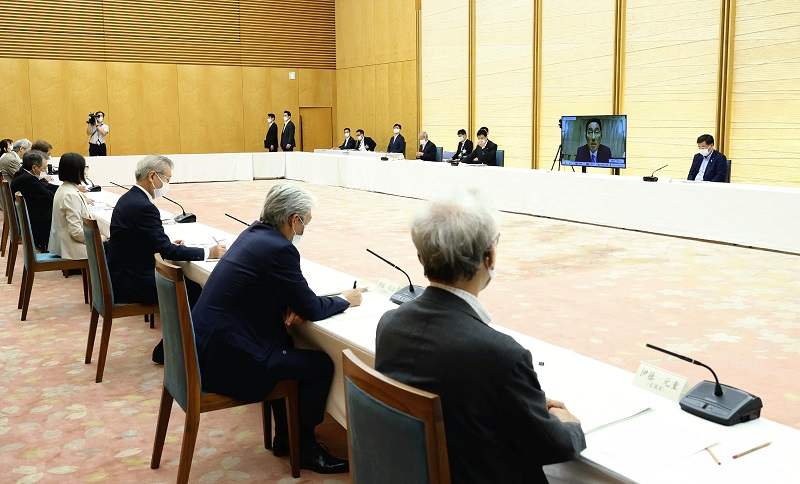Many links between senior politicians and Unification Church mere formality

Prime Minister Fumio Kishida speaks at a meeting online on Wednesday.
1:00 JST, August 29, 2022
At least 31 high-ranking government officials have had links with the Unification Church and over 70% of them had just formal contact such as attending events run by the group and sending congratulatory messages, The Yomiuri Shimbun has learned.
According to a Yomiuri Shimbun survey, at least 31 of the 73 Liberal Democratic Party and Komeito Diet members who fill the top three slots at each ministry — the minister, state minister and parliamentary vice minister — had some form of contact with the group, which is officially called the Family Federation for World Peace and Unification. These officials include eight ministers in Prime Minister Fumio Kishida’s reshuffled Cabinet that was launched this month.
Forty-one lawmakers said they had no contact with the organization, and the office of Toshiro Ino, the state minister of defense and the cabinet office, said it was “still investigating” if there had been any ties.
The 31 officials who admitted contact with the religious group comprised eight ministers, 11 state ministers and 12 parliamentary vice ministers.
Nineteen officials, including Daishiro Yamagiwa, minister in charge of economic revitalization, had personally attended Unification Church events or had a secretary attend on their behalf. Ten officials, including Ayano Kunimitsu, parliamentary vice minister for internal affairs and communications, had sent congratulatory and other messages to the group’s meetings. Of the 31 officials who acknowledged links with the group, 22 — more than 70% — had had only some formal contact. Toshiro Toyoda, state minister of land, infrastructure, transport and tourism, was among the government officials who was unaware of having had contact with the group.
According to the Yomiuri Shimbun survey, six officials had monetary links to the church. Internal Affairs and Communications Minister Minoru Terada; Health, Labor and Welfare Minister Katsunobu Kato; Yamagiwa; and Jiro Kimura, parliamentary vice minister of defense and the cabinet office, had paid meeting attendance fees and other payments. State Minister for Foreign Affairs Kenji Yamada and one other had an affiliated organization purchase tickets to their fund raising parties.
Some lawmakers had received the Unification Church’s support in elections. Church-related individuals had telephoned voters to drum up support for Tsuyoshi Hoshino, state minister of the cabinet office. The group also provided Kimura, through a third party, with a list of voters for last autumn’s House of Representatives election.
Many of the lawmakers that had connections to the group apparently felt that having interactions with a wide range of people was “essential” for winning a single-seat constituency.
“I think politicians want support from many people,” former LDP Secretary General Toshihiro Nikai said Aug. 24 during a speech in Tokyo. “We don’t really have any right to choose the people who support us.”
“There’s no way to know instantly if a certain person is good or bad,” Nikai added.
“It’s concerning that politicians would receive support from a problematic group just to win more votes. They should examine such an organization as much as possible, even though it is difficult to determine its true nature,” said Reitaku University Prof. Kazuhisa Kawakami, an expert on political psychology. He criticized the politicians that had contact with the group, saying, “We must say that they were too careless about their behavior.”



